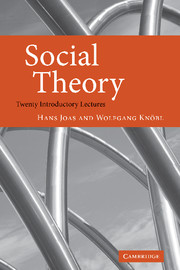Book contents
- Frontmatter
- Dedication
- Contents
- Introduction
- I What is theory?
- II The classical attempt at synthesis: Talcott Parsons
- III Parsons on the road to normativist functionalism
- IV Parsons and the elaboration of normativist functionalism
- V Neo-utilitarianism
- VI Interpretive approaches (1): symbolic interactionism
- VII Interpretive approaches (2): ethnomethodology
- VIII Conflict sociology and conflict theory
- IX Habermas and critical theory
- X Habermas' ‘theory of communicative action’
- XI Niklas Luhmann's radicalization of functionalism
- XII Anthony Giddens' theory of structuration and the new British sociology of power
- XIII The renewal of Parsonianism and modernization theory
- XIV Structuralism and poststructuralism
- XV Between structuralism and theory of practice: The cultural sociology of Pierre Bourdieu
- XVI French anti-structuralists (Cornelius Castoriadis, Alain Touraine and Paul Ricoeur)
- XVII Feminist social theories
- XVIII A crisis of modernity? New diagnoses (Ulrich Beck, Zygmunt Bauman, Robert Bellah, and the debate between liberals and communitarians)
- XIX Neo-pragmatism
- XX How things stand
- References
- Author index
- Subject index
XIV - Structuralism and poststructuralism
Published online by Cambridge University Press: 05 June 2014
- Frontmatter
- Dedication
- Contents
- Introduction
- I What is theory?
- II The classical attempt at synthesis: Talcott Parsons
- III Parsons on the road to normativist functionalism
- IV Parsons and the elaboration of normativist functionalism
- V Neo-utilitarianism
- VI Interpretive approaches (1): symbolic interactionism
- VII Interpretive approaches (2): ethnomethodology
- VIII Conflict sociology and conflict theory
- IX Habermas and critical theory
- X Habermas' ‘theory of communicative action’
- XI Niklas Luhmann's radicalization of functionalism
- XII Anthony Giddens' theory of structuration and the new British sociology of power
- XIII The renewal of Parsonianism and modernization theory
- XIV Structuralism and poststructuralism
- XV Between structuralism and theory of practice: The cultural sociology of Pierre Bourdieu
- XVI French anti-structuralists (Cornelius Castoriadis, Alain Touraine and Paul Ricoeur)
- XVII Feminist social theories
- XVIII A crisis of modernity? New diagnoses (Ulrich Beck, Zygmunt Bauman, Robert Bellah, and the debate between liberals and communitarians)
- XIX Neo-pragmatism
- XX How things stand
- References
- Author index
- Subject index
Summary
Should you glance back over our lectures so far, you may come away with the impression that the development of modern sociological theory has been an overwhelmingly American, British and German affair, with other nations playing no more than a minor role. But the reality is quite different. The (geographical) focus of our account is due primarily to the fact that these national traditions of sociology were very much aware of and generally responded quickly to one another, allowing us to proceed more or less chronologically in the preceding thirteen lectures: ‘First came Parsons, then his predominantly American critics, followed by attempts at synthesis in Europe by Habermas, Luhmann and Giddens, who in turn criticized each other, along with certain attempts to develop Parsons' legacy in modified form’ – this has been the ‘plot’ of our story so far.
However, the simple elegance of this ‘plot’ cannot be sustained within the framework of our lectures – at least if one takes the French contribution to the development of modern sociological theory as seriously as it deserves. For until the late 1960s, the social sciences and humanities in France formed a continent apparently sufficient unto itself. This was bound up with the fact that there are vigorous and productive intellectual traditions in France that laid the foundations for a highly autonomous, not to say isolated national development. This was particularly apparent in the case of sociology. Here, the work of Emile Durkheim dominated to a degree unknown in other countries.
- Type
- Chapter
- Information
- Social TheoryTwenty Introductory Lectures, pp. 339 - 370Publisher: Cambridge University PressPrint publication year: 2009
- 1
- Cited by



